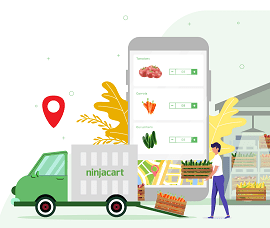Ninjacart launches ‘FoodPrint’, a traceability initiative for fruit and vegetable
Consumers will now be able to trace the journey of farm produce and view the real-time footprint data of the fresh fruits and vegetables
India’s leading B2B fresh food supply chain company Ninjacart- the leading has recently launched ‘FoodPrint’, a complete food traceability infrastructure that captures the end-to-end footprint traceability of fruits and vegetables which moves from farm to home. The FoodPrint initiative is launched on the occasion of “World Food Safety Day” declared by the Food and Agriculture Organization of the United Nations and World Health Organization (WHO), which is observed on the 7th of June every year.
As per reports, this is Ninjacart’s first step towards achieving its motive of providing “safe food for billion people in India”. With FoodPrint, a consumer will now be able to trace the journey and view the real-time footprint data of the fresh fruits and vegetables they ordered through the FoodPrint Viewer feature available on the official website. To avail this feature, one has to order from Ninjacart’s partner grocery store through Swiggy, Zomato, Dunzo, and other online platforms, to view the Foodprint data.
Talking about ‘Food Print’ initiative Thirukumaran Nagarajan, Co-Founder & CEO, Ninjacart said, “In the year 2018, we took it upon ourselves to provide safe food for India’s billion people. We are happy to have launched this initiative alongside “World Food Safety Day” which stands for “Food Safety, Everyone’s Business”.
“COVID-19 and its impact on every aspect of human life have made people view every decision of purchasing in light of health and safety. We knew that building this infrastructure was not an easy journey. But we persistently worked towards it for two years. Today with ‘FoodPrint’, we have taken the first step towards bringing that idea to fruition. We all have understood the pertinence of traceability given the current situation. Accountability plays a very big role in the supply chain of fresh produce”, Nagarajan added.
Ninjacart’s ‘FoodPrint’ traces right from, who is the farmer, when was it harvested, the truck that carried the produce, the warehouse that processed it, the helper who handled the product at the warehouse, a retailer who brought the product, and how it was delivered to the consumer’s doorstep. With the help of cutting edge technology such as RFID tags, a product is mapped right from the time a farmer brings the product to the collection centres and the same foodprint ID is kept intact till it reaches the retailer and then the consumer. All this is possible by entering the order number that one receives on the Realtime Footprint Viewer on the website www.ninjacart.com under the traceability tab.
Consumers will now be able to trace the journey of farm produce and view the real-time footprint data of the fresh fruits and vegetables they ordered through the FoodPrint Viewer feature available on the official website. One has to order from Ninjacart’s partner grocery stores through Swiggy
Consumers will now be able to trace














